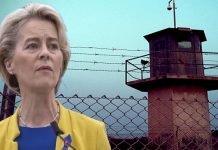Former Royal Marine Dan O’Mahoney will take on a new role to drastically reduce the number of small vessels arriving on English coast with migrants from France.
Priti Patel has hired a leading crimebuster to tackle migrant boats crossing the Channel.
Ex-National Crime Agency bigwig Dan O’Mahoney will have the new role of Clandestine Channel Threat Commander.
The UK witnessed a record 202 migrants crossed from France in 20 boats on Thursday.
Since January more than 3,580 have made the perilous journey to reach UK shores. Kent coastguards are constantly mounting search and rescue operations.
Ms Patel said: “The number of illegal small boat crossings is appalling. We are working to make this route inviable and arresting criminals facilitating crossings.
“Dan’s appointment is vital to cutting this route by bringing together all operational partners in the UK and in France.”
Mr O’Mahoney has been chief of the UK’s Joint Maritime Security Centre since last year bringing together 15 agencies to protect British waters from all threats.
Before that he was with the National Crime Agency, the Border Crime Command at Heathrow Airport and served with the Royal Marines served 3 Cdo Brigade HQ and Sigs Squadron and 539 ASRM deploying to Kosovo and Iraq on Op Telic I.
He said: “This role is vitally important in the fight to end the heinous crime of people smuggling across the Channel.”
Does the UK have the right to send refugee’s and asylum seekers back?
The UK could, under certain circumstances, send the people crossing the Channel on dinghies back to France or another EU country upon arrival. This is because of an EU law known as the Dublin Regulation.
Under the terms of the Dublin Regulation, a refugee should normally have their asylum claim examined in the first EU country they enter. If the claim is accepted, they get refugee status in that country.
In practice, this means that upon arrival in the UK asylum seekers will have their fingerprints checked against an EU database known as Eurodac. The database allows immigration officials to see if an asylum seeker has launched an application in any other EU countries, or come into contact with the authorities there, and determine which country should process their claim.
There are some cases in which this rule doesn’t apply. For example, if an applicant for asylum has a family member who has already successfully claimed asylum in another EU country, then that country is where their claim should be reviewed. There are a number of further exceptions, including if the applicant is a minor, if several family members claim asylum around the same time, or of the applicant is dependent on the assistance of a parent or family member legally resident in the EU.
The Dublin Regulation establishes the Member State responsible for the examination of the asylum application. The criteria for establishing responsibility run, in hierarchical order, from family considerations to recent possession of visa or residence permit in a Member State, to whether the applicant has entered EU irregularly, or regularly.
- An early warning, preparedness and crisis management mechanism, geared to addressing the root dysfunctional causes of national asylum systems or problems stemming from particular pressures.
- A series of provisions on protection of applicants, such as compulsory personal interview, guarantees for minors (including a detailed description of the factors that should lay at the basis of assessing a child’s best interests) and extended possibilities of reunifying them with relatives.
- The possibility for appeals to suspend the execution of the transfer for the period when the appeal is judged, together with the guarantee of the right for a person to remain on the territory pending the decision of a court on the suspension of the transfer pending the appeal.
- An obligation to ensure legal assistance free of charge upon request.
- A single ground for detention in case of risk of absconding; strict limitation of the duration of detention.
- The possibility for asylum seekers that could in some cases be considered irregular migrants and returned under the Return Directive, to be treated under the Dublin procedure – thus giving these persons more protection than the Return Directive.
- An obligation to guarantee right to appeal against transfer decision.
- More legal clarity of procedures between Member States – e.g. exhaustive and clearer deadlines. The entire Dublin procedure cannot last longer than 11 months to take charge of a person, or 9 months to take him/her back (except for absconding or where the person is imprisoned).
There is no obligation on refugees to claim asylum in the first safe country they reach
The 1951 UN Refugee Convention (also known as the Geneva Convention) defines what a refugee is, what rights a refugee has, and the responsibilities of states towards refugees.
It defines a refugee as someone who “owing to a well-founded fear of being persecuted for reasons of race, religion, nationality, membership of a particular social group or political opinion” has fled their own country or (if they have no nationality) country of usual residence, and is unable or unwilling to return to it or seek protection from it.
Being recognised as a refugee gives you the right to not to be returned to the country you have fled, as well as a minimum standard of rights and freedoms in a safe country.
An asylum seeker is someone who is in need and search of refuge. The right to seek asylum from persecution in other countries is a universal human right, set out in Article 14 of the UN Declaration of Human Rights.
Practically speaking, an asylum seeker is someone who has applied for refugee status (or another form of international protection) in another country, and is awaiting a decision on that application. They can only apply once they physically reach the country.
In the UK, once an asylum seeker has had their application processed, they may receive permission to stay as a refugee for five years (after which they can apply to settle in the UK). They may also be given “permission to stay for humanitarian reasons” or other reasons, or their application may be rejected in which case, if no appeal is successful, they have to leave the UK unless they face a “real risk” of serious harm in the case of deportation.
Turning back the tide
The best method of stopping these life risking channel crossings is to remove the very real circumstances that force people to leave their homes, family’s and country in the first place.
Instead of first world countries making billions on the exploitation of third world regions through theft of resources and selling arms, arms used to wage proxy wars with the objective of placing into power governments more amicable to western corporate deals. We should invest in lifting these country’s out of poverty by building infrastructure that allows progress.
A lack of infrastructure comes at an enormous economic and social cost. Over 1.1 billion people — almost 16% of the world’s population — still have no access to electricity. About 663 million people worldwide lack access to clean water, and 2.4 billion people do not have adequate sanitation. And one-third of the world’s population is not served by an all-weather road.
Infrastructure is the backbone of any country, generating jobs, improving the quality of life for the poor and boosting economic growth. As I’ve blogged before, such investment is integral to poverty alleviation.
Poverty reduction requires economic growth which, when accompanied by sound macroeconomic management and good governance, results in sustainable and socially inclusive development. Greater access of the poor to education and health services, water and sanitation, employment. These should be the aims of western country’s if they want to turn back the tide of asylum seekers and migrants. If you and your family were living in the circumstances most migrants have endured, you would no doubt be paddling the other way.
Support Independent Journalism Today
Our unwavering dedication is to provide you with unbiased news, diverse perspectives, and insightful opinions. We're on a mission to ensure that those in positions of power are held accountable for their actions, but we can't do it alone. Labour Heartlands is primarily funded by me, Paul Knaggs, and by the generous contributions of readers like you. Your donations keep us going and help us uphold the principles of independent journalism. Join us in our quest for truth, transparency, and accountability – donate today and be a part of our mission!
Like everyone else, we're facing challenges, and we need your help to stay online and continue providing crucial journalism. Every contribution, no matter how small, goes a long way in helping us thrive. By becoming one of our donors, you become a vital part of our mission to uncover the truth and uphold the values of democracy.
While we maintain our independence from political affiliations, we stand united against corruption, injustice, and the erosion of free speech, truth, and democracy. We believe in the power of accurate information in a democracy, and we consider facts non-negotiable.
Your support, no matter the amount, can make a significant impact. Together, we can make a difference and continue our journey toward a more informed and just society.
Thank you for supporting Labour Heartlands












